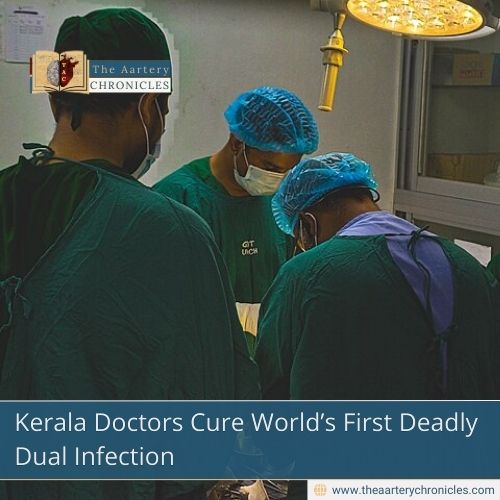

Kerala Doctors Cure World’s First Deadly Dual Infection
Kerala’s healthcare system has achieved a global first by successfully treating a 17-year-old boy who was infected with both amoebic meningoencephalitis and Aspergillus flavus. Health Minister Veena George announced that after intensive treatment and multiple brain surgeries, the teenager has now fully recovered.
A Rare and Fatal Combination
According to medical experts, both amoebic meningoencephalitis and Aspergillus flavus infection are considered highly lethal conditions on their own, often carrying a mortality rate close to 99 per cent worldwide. Until now, no patient diagnosed with both infections together had survived.
“This is the first time such a case has been successfully treated anywhere in the world,” Minister George announced, crediting the coordinated efforts of medical teams at Alappuzha and Thiruvananthapuram Medical Colleges.
Understanding the Infections
- Amoebic meningoencephalitis: A rare but deadly infection of the brain caused by free-living amoebae, typically contracted through freshwater lakes, rivers, or ponds.
- Aspergillus flavus infection: A fungal infection caused by a species commonly found in the environment, which can invade the brain and other organs in vulnerable patients.
From Diagnosis to Recovery
The boy was admitted to Alappuzha Medical College, where laboratory tests on his spinal fluid confirmed the presence of both the deadly amoeba and the fungal infection. Soon after, MRI scans revealed pus accumulation in the brain. He was transferred to Thiruvananthapuram Medical College for urgent neurosurgical care.
Doctors performed two brain surgeries after his condition worsened. In addition, a combination of five powerful drugs was administered to combat the dual infections. After three months of treatment, followed by close monitoring, the boy recovered fully and was declared “perfectly normal” during a follow-up evaluation.
Why This Case Matters
Health Minister George explained that Kerala’s structured treatment guidelines, introduced three years ago, played a vital role in saving the boy’s life. “Without early detection and standardised care, survival in such cases is almost impossible,” she said.
Dr. Aravind, Associate Professor in the Department of Infectious Diseases, noted, “Both infections are individually fatal. Using a multidisciplinary approach, we were able to turn around what would otherwise have been a hopeless situation.”
Situation in Kerala
Over the past two years, Kerala has reported 86 cases of amoebic meningoencephalitis, of which 21 resulted in death, a mortality rate far lower than global averages. The minister clarified that the rise in detected cases is due to improved diagnostic capacity, not necessarily an increase in infections.
Post-mortem studies have shown that nearly 11 per cent of meningitis deaths previously labelled as “unknown cause” were actually due to amoeba.
Conclusion
Kerala’s doctors have made history by successfully treating the world’s first patient with both amoebic meningoencephalitis and Aspergillus flavus infection. This achievement shows that with early diagnosis, advanced surgeries, and proper treatment methods, even life-threatening conditions can be overcome.
Source: Inputs from various media Sources
I’m a pharmacist with a strong background in health sciences. I hold a BSc from Delhi University and a pharmacy degree from PDM University. I write articles and daily health news while interviewing doctors to bring you the latest insights. In my free time, you’ll find me at the gym or lost in a sci-fi novel.
- Priya Bairagi
- Health News and Updates,People Forum
- 4 September 2025
- 09:00








